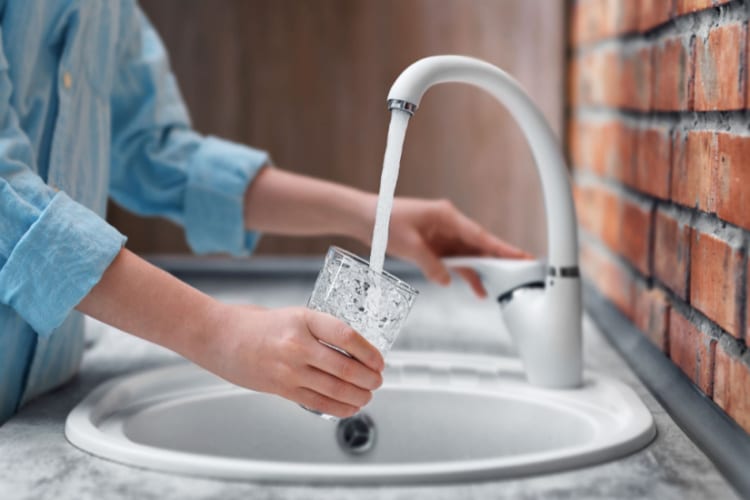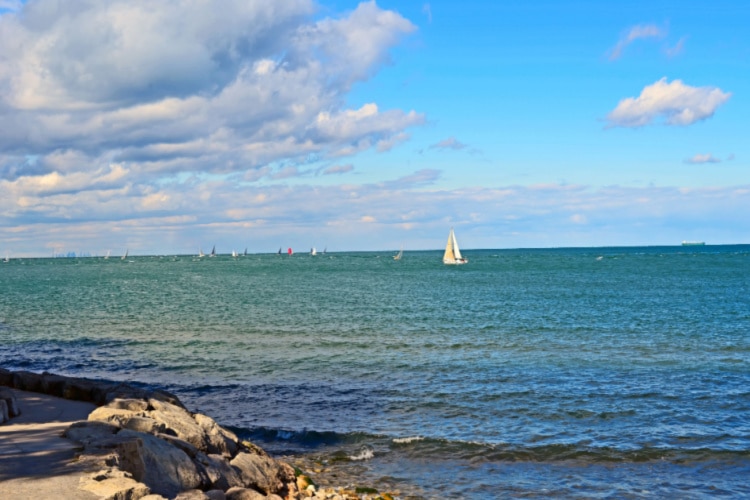Toronto tap water is very clean, so you don’t necessarily have to use a water filter. However, is it safe to drink?
In this article, we’ll discuss:

Toronto Water Quality Report: What Is in the Water?
The City of Toronto releases an annual water quality report. According to the 2021 Drinking Water Quality Analysis Summary Report, the most prevalent bacteria and minerals in Toronto drinking water are:
- Heterotrophic bacteria: 4.8 CFU/mL plate count (no health risk to humans)
- Coliform bacteria: 1.5 CFU/100mL (membrane filtration), 99.37% absent
- Dissolved solids: 215 mg/L
- Calcium: 32.8 mg/L
- Chloride: 27.3 mg/L
- Magnesium 8.5 mg/L
- Potassium: 1.7 mg/L
- Selenium: 1.5 mg/L
- Sodium: 14 mg/L
- Sulphate: 24.7 mg/L
The most common disinfection agents and byproducts in Toronto’s water system on average are:
- Chlorine: 1.7 mg/L
- Trihalomethanes: 27.8 µg/L
- Bromochloracetic acid: 1 µg/L
- Dichloracetic acid: 1.8 µg/L
- HAA-5: 2.9 µg/L
- Trichloroacetic acid: 1.3 µg/L
While water from the treatment plants do not contain lead, it is still possible to find lead in the tap water. This is due to lead corrosion of water-carrying materials that may be present in homes and buildings from:
- Water service pipes in homes or buildings from before the mid-1950s
- Soldering that was used to connect pipes before 1990, and
- Any leaded-brass water fixtures, like valves or faucets
The city began adding phosphate to the water in 2014 to create a protective coating on pipes to reduce the potential for lead contamination. While lead may sometimes still be present, recent tests show that there is less lead in toronto tap water now than before the phosphate program began.
Is the Water Hard or Soft?
The water in Toronto is moderately hard, rating 117 mg/L of calcium carbonate. Hard water has more minerals like magnesium and calcium than softer water.
Where Toronto Gets Its Water From
Drinking water from Toronto comes from Lake Ontario. Toronto Water Authorities collects over 2.64 million gallons (10 million liters) of water from the lake daily to treat and distribute within Toronto and around the southern portions of the York Region.

How Tap Water Is Treated in Toronto
The City of Toronto treats more than 2.6 million gallons (about 10 million liters) of water each day and treats it via four water treatment plants that operate 24 hours a day, seven days per week:
- R.C. Harris Water Treatment Plant: This Art Deco “Palace of Purification” can produce up to 250 million gallons (950 million liters) of water per day and provides 30% of Toronto’s drinking water.
- R.L. Clark Water Treatment Plant: This facility can produce up to 162 million gallons (615 million liters) of water per day and provides 30% of Toronto’s drinking water.
- F.J. Horgan Water Treatment Plant: This facility can produce up to 211 million gallons (800 million liters) of water per day and provides 20% of Toronto’s drinking water. It’s the first and only Toronto plant to treat with Ozone rather than chlorine.
- Island Water Treatment Plant: This facility can produce up to 116 million gallons (440 million liters) of water per day and provides another 20% of Toronto’s drinking water.
The treatment process in Toronto’s water treatment facilities is as follows:
- Collection: All the water comes from Lake Ontario. The pipes for the drinking water are up to 3.1 miles (5 km) from shore. From there, the pipes connect to one of Toronto’s four water treatment plants.
- Filtration 1: The water goes through screens to remove large pieces of debris. Then, filters remove additional impurities from the water.
- Filtration 2: Added alum or poly aluminum chloride creates a jelly-like substance that collects larger particles for additional filtration.
- Filtration 3: As water passes through settling basins, larger particles fall to the bottom. The clear water at the top goes through a filter of gravel, sand, and carbon to further remove impurities and bacteria.
- Disinfection: Either chlorine or ozone disinfects the water to destroy bacteria, algae, and viruses. Ammonia helps to keep chlorine levels consistent while traveling through the distribution system.
- Enhancements: Fluoride is added to help prevent tooth decay.
- Corrosion control: Phosphoric acid provides corrosion control to keep residents safe from lead pipes.
- Pumping: 18 pumping stations pump the water to Toronto homes, schools, businesses, and other facilities.
Do They Have the Cleanest Tap Water?
Toronto is one of the states with the cleanest tap water in Canada. Toronto won third place in the 2007 Best of the Best Water Taste Test, which pitted Toronto water against other tap waters across North America.
The mayor at that time, David Miller, claimed water in Toronto was “purer than Perrier.” In fact, he always made a point of serving tap water instead of bottled water at council meetings.
After a deadly e.Coli and Campylobacter jejuni outbreak in 2000 in Walkerton, Ontario, the province has enacted stricter testing standards. The amount of testing that Toronto does always meets or exceeds the stipulated standards of the Safe Drinking Water Act set forth by the Ministry of the Environment, Conservation and Parks (MECP)
Each Toronto treatment facility tests the water every six hours. This means that they test the water in each facility over 6,000 times per year, for a combined total of 24,000 tests each year. The treatment facilities also conduct 15,000 bacteriological tests yearly.
Yearly water quality analysis reports indicate that Toronto’s water does not have a harmful level of chemicals. Also, there shouldn’t be any coliforms detectable, with the average level registering at 1.5 CFU/100mL. Luckily, not all coliforms are harmful, and the 99.37% absent in tested water samples is a very good level.
Conclusion
Toronto’s tap water is safe to drink with no foul taste. Tap water in Toronto comes from Lake Ontario and undergoes high-quality filtration and treatment at one of four treatment plants before reaching homes and businesses.
It’s tested multiple times daily, meeting and exceeding testing regulations, making it one of the cleanest tap water states in Canada.
Canada as a whole is one of the top countries with the cleanest tap water.